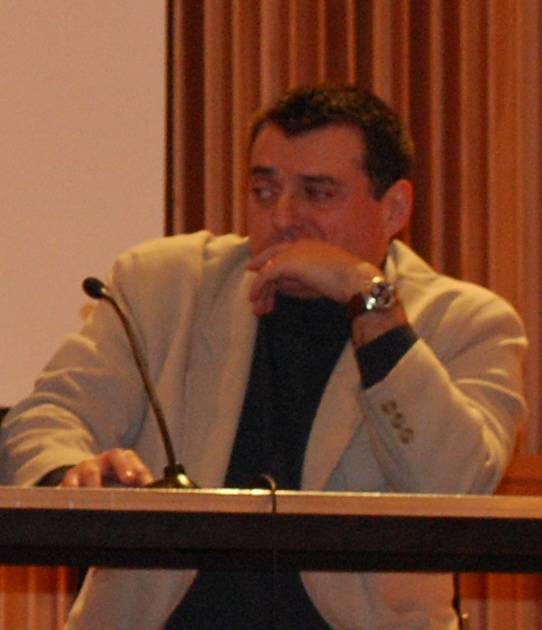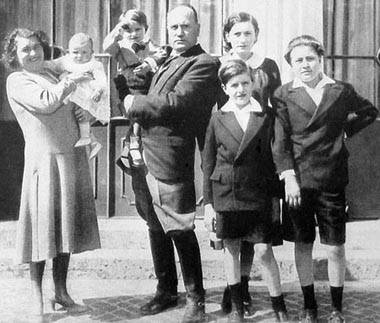The Other Side of Benito Mussolini
Is this the umpteenth made-for-TV documentary about the Italian dictator and fascism? No. Mussolini, l’ultima notte is part film, part documentary. But what distinguishes these 53 minutes of intense storytelling is the up-close portrayal of Mussolini the man. Here he is not the historical figure documented in various ways by dozens of films and omnipresent in history textbooks. This is the story of a man at the end of his days.
Made for TV, its debut screening was hosted by John Calandra Italian American Institute of Queens College/CUNY and the Italian Cultural Instituteof New York at the CUNY Graduate Center in Manhattan.
After a brief introduction by Professor Anthony J. Tamburri, Dean of the Calandra Institute and a presentation by Francesco Maria Talò, Consul General of New York the film was screened before a captivated audience.
The film begins with Benito Mussolini’s speech at the Teatro Lirico in Milan on December 17, 1944. Using authentic black and white images and documents from the Istituto Luce, it recreates and reenacts the last few months of the dictator’s life that ostensibly took place.
Undertaking the decidedly difficult roles of director, screenwriter, and lead actor, Ugo De Vita, is credited with portraying the human side of a singular individual who, until today, was depicted more for his political acts than for his personal and tragic experience as a human being. In an extremely significant and emotionally charged scene, we see Mussolini alone. He has just received news of the peace treaty with the Germans.
He is seated in the corner of a room, enclosed in semidarkness, with his head in hands, crying, desperate, despondent. He shouts: "They spoke of an official trial. But where? When? No one has come here… I was wrong, I admit, but mistakes are often made in politics!" There is another particularly dramatic moment when the dictator meets with his wife Rachel and orders her to run away with their sons as soon as possible. It is a scene that ends with the tender embrace of two lovers who are painfully aware of the imminent end.
In Italy, Musssolini will debut in Rome on February 10 (in conjunction with the release of the book by the same name) and will be screened in the Chamber of Deputies sponsored by the organization Nessuno Tocchi Caino.
................
We interviewed the director of the documentary, Ugo De Vita, who was also present at the screening.
How did the idea for a film based on Benito Mussolini come about? And why did you choose to portray the human side of the man rather than the historical figure?
Initially, I was asked to play Benito Mussolini for a very ambitious Italian television project. It was a proposal that I thought a lot about, because for me, being on the left, it is was a rather difficult choice. But I believe that there shouldn’t be any subjects that I “refuse” in my work. And so I started working on this project. Then for no obvious reason the project was pulled. And so I decided to do something different. Not a film but a documentary film. I was not afraid to tackle this role and actually, I think I made an interesting contribution.
I think the real thrust of this work is my impact on the character of Mussolini. From the outset this is the first time that his character has been approached in a different way. For me, this distinction was stellar. It was really difficult to get at Mussolini because he was a man of power, that is, a politician and a dictator. But the film does not underestimate the serious issues of accuracy and Mussolini’s historical significance. There is a similar issue with the racial laws because many people discuss them, but few understand their absurdity. [Editor's note: the film includes an excerpt of the Manifesto of Race from 1938.] And I believe that he takes on an increased importance when he is represented on a human scale.
It is pointless and even dangerous to think of the devil. Instead, looking at the “person” of Mussolini is important for me to understand the entire path of degeneration.
Why summarize his life in a few minutes?
Those last few days represented in the documentary tell a horrific story. On one hand there is this presumption of glory and illusion which hovers over the first part of the film, and on the other, the total disintegration of affection and family. The end of everything.
What impact do you think you’ve had on the American audience? What do you expect in Italy?
Some politicians, both on the right and the left, who have already seen the film have liked the work. Nevertheless I know perfectly well what will be discussed. The real problem is that to interpret the character of Mussolini, to be an effective actor, I had to create a certain amount of empathy in the viewer. Otherwise, “I would not have gotten it,” I would not have succeeded in capturing his/her attention. This inevitably influenced, in substance and effect, the direction of the film.
It is a problem that I have already taken into account because it is normal for it be this way. I sincerely believe that the book will have fewer problems, because there these issues can be dealt with in a more systematic way.
Translated by Giulia Prestia



































i-Italy
Facebook
Google+
This work may not be reproduced, in whole or in part, without prior written permission.
Questo lavoro non può essere riprodotto, in tutto o in parte, senza permesso scritto.